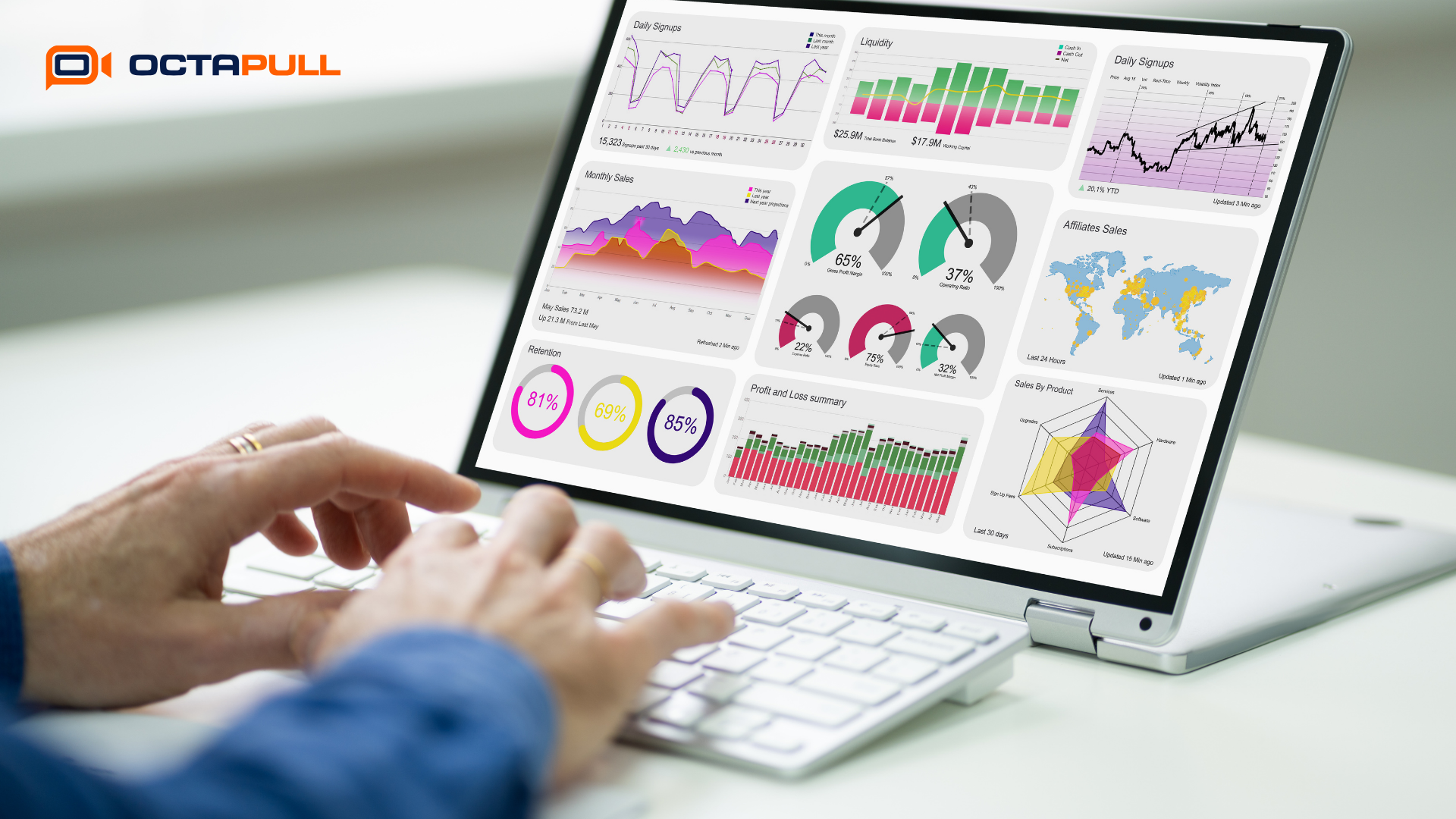Financial Information Management: 7 Ways to Improve Your Business Efficiency
With the increasing prevalence of digital and remote work environments, efficient financial information management has become critical to the success and sustainability of businesses.
Hence, organizations and enterprises must adopt suitable strategies to manage and analyze their financial data effectively, improve decision-making, and enhance the efficiency of their financial processes.
In this sense, using suitable business software and tools, like financial information management systems (FIMS), and automation software, such as Octapull SFA and Octapull B2B, can streamline financial processes, increase data security, and improve collaboration of remote teams.
What is Financial Information Management?
Financial information management involves collecting, organizing, storing, managing, and utilizing financial data within an enterprise or organization.
By implementing necessary strategies, practices, and digital tools, organizations can ensure that their financial information is accurately recorded, up to date, carefully managed, and can be used in important decision-making processes.
Financial information management involves analyzing and using various economic data, including budget formulation, transactions, sales forecasts, reports, cash and debt management, and treasury operations.
Proper information management plans support business operations by complying with legal requirements and tax obligations and maintaining long-term sustainability and operational success.
Since financial information management is integral to remote sales operations, organizations must adopt essential tools and practices.
These include sales information management platforms and video conferencing software, such as Octapull SFA and OctaMeet, to support communication and sales management for their remote teams.
What are Financial Information Management Systems?
Financial information management systems (FIMS), specialized accounting software, offer a reliable platform to manage and utilize financial data and processes effectively, especially in remote working environments.
Fulfilling organizational needs such as data collection, processing, and reporting, FIMS streamlines financial operations and enables regular tracking of financial details such as daily transactions, income, expenses, assets, and liabilities in real-time.
Providing an overall look over organizations’ financial health, FIMS tools encourage transparency, increase accountability and efficiency, and allow organizations to maintain long-term enterprise sustainability.
What is the Role of Financial Information Management in Business Processes?
Financial information systems play a crucial role in financial information management and offer various advantages to remote working organizations and enterprises.
Accurate Accounting and Reporting
Financial information management allows organizations to handle their accounting processes such as payrolls, accounts payable, and receivable as well as detailed financial reports such as balance sheets, income, and cash flow statements.
In this sense, financial information management tools offer a single platform for budgeting and forecasting. By doing so, they enable organizations to create detailed financial plans and roadmaps, set realistic budgets and achievable goals, and evaluate the effectiveness and accuracy of different scenarios.
Risk Management and Compliance with Standards
Financial information management systems can aid organizations and enterprises in developing necessary strategies by analyzing and mitigating financial risks for both short- and long-term success.
These systems can monitor financial operations such as transactions, detect suspicious activities, and ensure that all the procedures align with legal regulations and requirements, reducing risks of fraud and complying with industry standards.
Data and System Security
Financial information management systems (FIMS) store sensitive financial information such as transaction records, customer data, and financial strategies.
Through robust advanced encryption standards (AES) and secure socket layer (SSL), FIMS safeguards financial data and maintains trust with stakeholders by encrypting data and preventing unauthorized access.
Additionally, access control mechanisms and authentication controls minimize the risks of threads by ensuring that only authorized personnel have access to sensitive financial data.
Sustainability and Scalability for Growth
By effectively managing financial resources, businesses can benefit from better scalability and sustainably continue their organizational growth.
By creating a stable and solid financial foundation and building adequate infrastructure, businesses can minimize potential risks and increase their return on investment (ROI).
However, their financial information management systems must also be able to reflect these changes and have the ability to handle growth across markets and regions.
Automation of Financial Processes
FMIS supports finance teams to minimize manual efforts and reduce errors by automating financial tasks and processes, including accounting, invoicing, and financial reporting.
Hence, FIMS increases the accuracy and efficiency of business operations by providing necessary optimizations shortening the duration of processes, and facilitating compliance with legal requirements.
Additionally, these tools can collect, categorize, and analyze data in real-time and prepare automatic reports according to the set categories. In this way, organizations can save time and make sure that departments and stakeholders are updated regularly.
On Premise and Cloud Installation Options
Although various FMIS offer both on-premise and cloud (SaaS) versions of their software, SaaS solutions have a significant advantage over the local versions.
These advantages include automatic security and feature updates, easier maintenance and licensing, disaster recovery, and backups in addition to automatic reporting and better financial data monitoring, management, and planning.
As cloud-based information management tools offer more flexibility and ease of use, remote working organizations can adopt these tools for their financial sales management processes.
7 Ways to Improve Your Business Efficiency
Enterprises and organizations must adopt various strategies and ways to improve the efficiency and productivity of their operations. Here are 7 effective ways to improve the efficiency of financial information management:
1. Implementing Cloud-Based FIMS
Adopting cloud-based (SaaS) FMIS allows organizations to access, store, and monitor their financial data in real time.
Especially in remote working, in which teams work from different locations, this strengthens collaboration by facilitating data sharing between teams and departments as well as enforcing protection against security breaches and threats.
In comparison to on-premises software, cloud-based financial information systems offer advanced functionality such as analysis capabilities, better risk management, accurate accounting, and easier data sharing in addition to regular and automatic updates, bug fixes, and easy to no maintenance.
Robust software such as Octapull SFA and B2B offers a user-friendly interface, integration capabilities with other business tools, advanced security features, enhanced planning, and scalability to support the operational success of businesses.
2. Integrating FIMS with Other Business Tools and Systems
Integration of FIMS with other business systems and software enhances operations by offering a central platform to view an organization’s financial health.
These include CRM (Customer Relations Management), SFA (Sales Force Automation), ERP (Enterprise Resource Planning), BI (Business Intelligence), cloud-based data sharing, accounting, automated expense tracking, and communication tools.
Integrating data from such systems provides valuable insights into overall performance, increases data accuracy between systems, offers better cash flow management and budgeting along with enhancing decision-making processes with better strategic planning.
3. Leveraging Data Analytics and Visualization
Data analytics and visualization facilitate the presentation of financial data to allow easier understanding and evaluation of such data.
By monitoring both financial and overall operational performance, enterprises can gain better control over their operations and manage them more effectively.
Data analytics and interactive reporting tools can offer detailed and comprehensive insights into financial data.
These tools can also aid in evaluating performance and financial status, identifying trends, forecasting future scenarios, and determining areas that may need to be optimized.
However, having data from separate sources may cause issues in financial reporting. In this sense, enterprises can set their financial metrics, use data visualization tools, connect their sources of data such as databases, spreadsheets, and accounting to a single central platform, and use automation tools.
4. Standardizing Financial Processes and Reporting
Standardizing financial reporting processes helps enterprises store their financial data consistently and accurately and facilitates sharing this data across all teams and departments, especially in remote working settings.
By eliminating redundancies and using automation software, errors can be minimized and data can be reported more effectively.
Standardization of financial data and reporting such data can be challenging due to costs, high complexity, and different financial standards.
However, enterprises can achieve this by choosing between the widely 2 accepted standards, GAAP (Generally Accepted Accounting Principles) and IFRS (International Financial Reporting Standards).
Using appropriate tools such as SFA (Sales Force Automation), BI (Business Intelligence), and specialized accounting and reporting software enables synchronizing financial data across their systems.
In this sense, standardizing financial reporting can significantly contribute to enhanced decision-making processes, higher compatibility within the same industry, improved transparency, and earning the trust of stakeholders.
5. Improving Data Security and Encryption Techniques
Implementation of robust encryption techniques and security measures against cyber threats is crucial for the data security of enterprises, especially for those adopting remote working.
Improving data security not only protects sensitive financial and customer data but also maintains compliance with legal regulations and protects the reputation of the organizations.
In this sense, remote employees can be provided with a secure virtual private network (VPN) and multi-factor authentication (MFA) when accessing enterprise systems and databases, allowing sensitive documents and data to be stored safely and preventing unauthorized access to such data breaches.
Employees should also be provided with training aiming to educate on cybersecurity threats and other potential malicious attacks to identify and approach such threats accordingly.
6. Analyzing the Latest Trends to Enhance Decision-Making
Using tools such as charts, graphs, and dashboards to present data in an easy-to-understand manner facilitates finance teams to analyze and determine new and latest trends suitable for the organization.
In this sense, the integration of new trends such as artificial intelligence (AI) and machine learning (ML) in finance offers various advantages.
These include speeding up processes, accurate forecasting, providing insights by analyzing large volumes of data, identifying patterns and trends, faster decision-making processes, advanced predictive analysis, and faster detection of errors and abnormal activities.
Another popular trend, Blockchain technology, offers different use cases in financial operations:
- Easier and faster domestic and cross-border payments
- Multiple forms of payments using cryptocurrencies
- Enhanced security and privacy
- Reducing costs and streamlining operations overall financial operations
Hence, it is important to use flexible and capable solutions to adapt to these latest trends, improve operations and facilitate collaboration of remote working employees.
7. Investing in FIMS Employee Training
Investing in ongoing financial information management training for employees is crucial, especially in remote work settings, as it ensures seamless operations, improves efficiency, and maximizes the benefits of financial management tools.
Training such as online workshops, and live and self-learning courses covering functionality, changes, updates, and security practices against new threats can be offered to employees.
Additionally, constructive feedback on their tasks can be provided and key performance indicators (KPIs) can be introduced to effectively measure their performance.
By investing in training, organizations can make sure that their remote team is equipped with technical and practical skills and knowledge to use financial management tools efficiently and contribute better to business operations.
Manage Your Sales Operations with Octapull SFA
Organizations and enterprises must use reliable and capable software to complete their digital transformation, effectively manage their financial processes, and achieve long-term success in business operations.
In this sense, with its revolutionary and robust solutions, OCTAPULL offers sales force automation (SFA) and B2B solutions to support financial operations and the success of organizations.
With its advanced Financial Module, Octapull SFA provides enterprises with advanced tools and features necessary to manage financial operations with better efficiency and increase businesses’ growth potential.
- Transaction Management: Client payments using cash, credit cards, checks, and direct bank transfers can be monitored from a single central platform, enabling businesses to track their incomes and expenses seamlessly.
- Effective Reporting: With daily balance sheet reporting, businesses can supervise their financial actions and make informed decisions based on data.
- Data Security and Integration: Integrating with other accounting software, financial data is stored safely and securely.
- Easier Risk Management: Financial processes can be segmented based on risk limits and completed securely. With effective risk management, businesses can maintain their financial stability and sustainability.
- Business Intelligence (BI) Module: Organizations can access their data in real-time, regularly monitor performance, and create specialized reports using dynamic reporting features, all of which contribute to the decision-making process.
- OctaMeet Integration: By offering seamless integration with our video conferencing solution, OctaMeet, organizations can manage their financial operations and daily communications from a central platform.
Octapull B2B for Your B2B Business Development Processes
Octapull B2B strengthens businesses’ online sales operations by enabling them to monitor financial information, and track orders and stocks, increasing customer satisfaction and recurrent sales.
Octapull B2B offers these advantages for the financial information management needs of enterprises:
- Financial Management: Efficient financial information management allows current account and business balance information to be monitored in real-time.
- Easier Transactions: Clients can complete the payments of their orders instantly using virtual POS or direct bank transfer options.
- Risk Limits and Safe Sales: Tracking customer orders in real time enables enterprises to forecast potential risks and securely conduct sales operations.
- ERP Integration: With seamless ERP integration, enterprises can manage all of their operations, including order management, inventory checks, and financial processes from a single platform faster and more efficiently.
- Effective Campaign Management: It is possible to set minimum sales limits and conduct safe sales by managing campaigns effectively.
If you would like to learn more about our Octapull SFA and B2B solutions and their advantages for your business processes, you can schedule a demo meeting with our product team.






